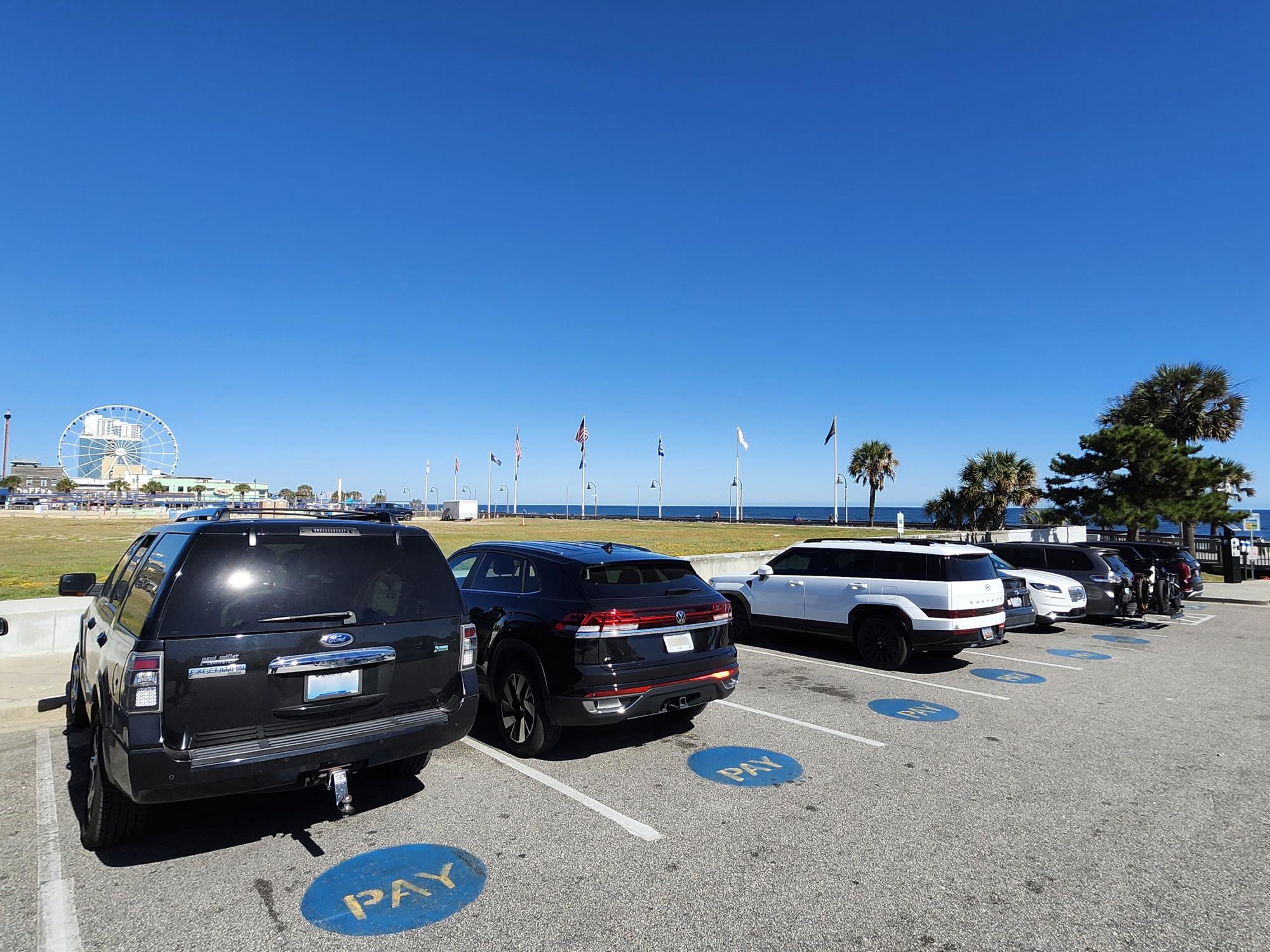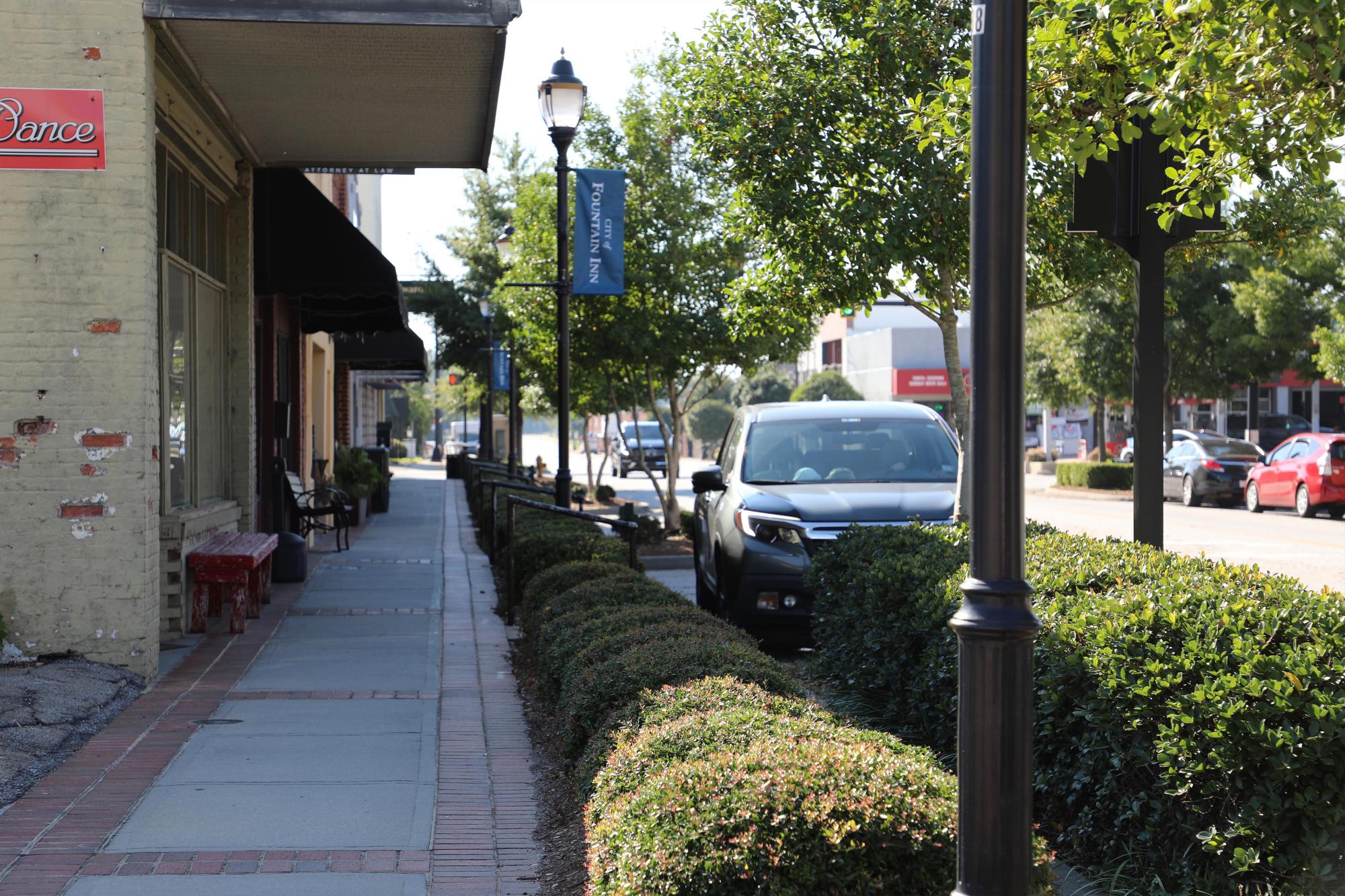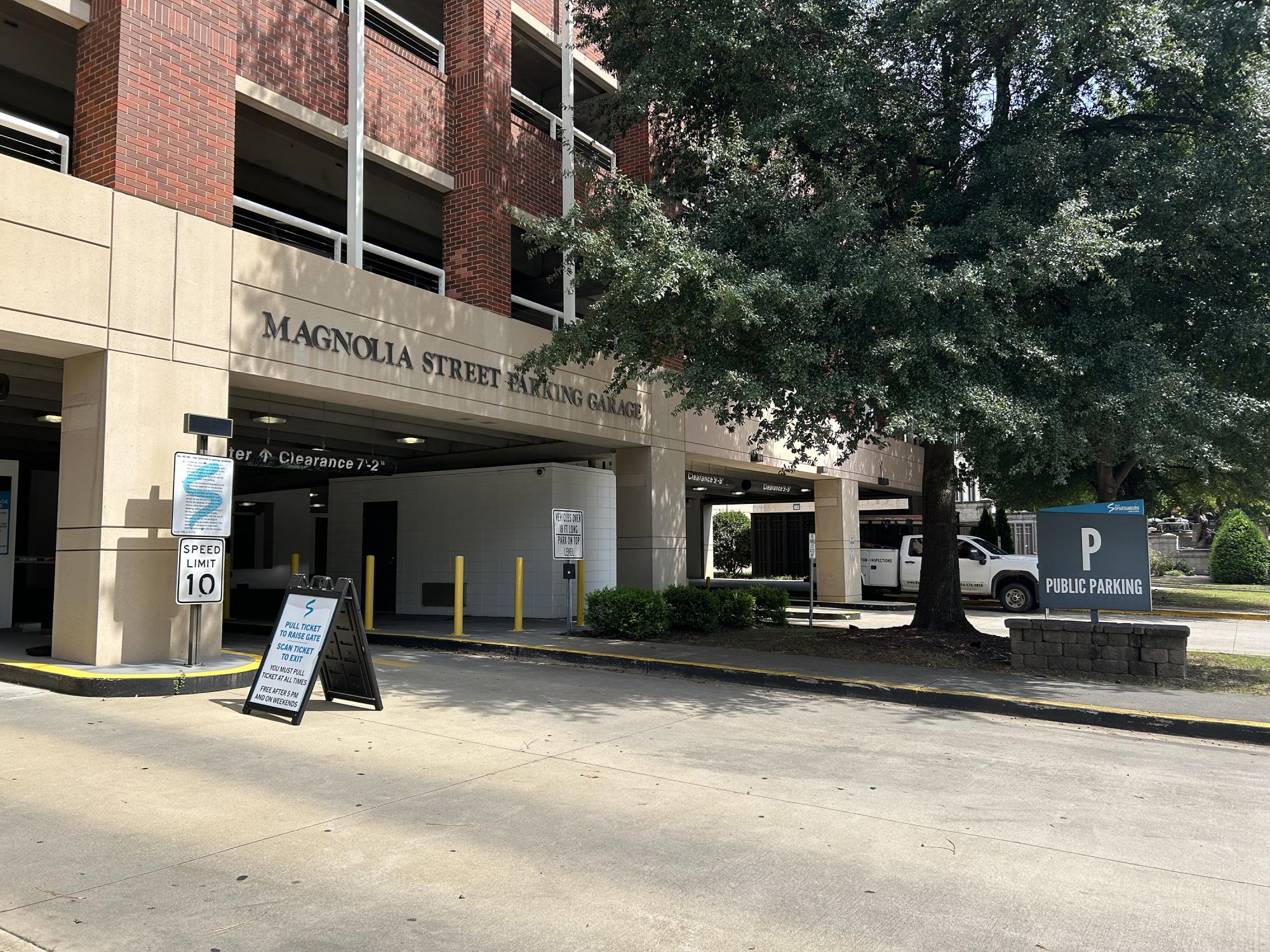With South Carolina being one of the fastest growing states in the nation in 2023, according to the U.S. Census Bureau, cities and towns across the state are implementing both tried-and-true and out-of-the-box strategies to manage public parking in their downtown business districts.
Myrtle Beach, Fountain Inn and Spartanburg are among those working to determine how to best allow for parking availability where it is needed most.
“We’ve got a wide mix across the city,” said Brian Schmitt, downtown research and development associate for the City of Myrtle Beach.

The paid parking spots at the end of 8th Ave. N. provide immediate access to the
Myrtle Beach Boardwalk and Promenade. Photo: City of Myrtle Beach.
The city employs paid, free and permit parking among its 2,608 parking spaces.
“Any area of the right-of-way that we manage [and where] we have the space is paid parking year-round,” he said, adding that the spaces are also enforced by a team of 17 full-time staffers, with 10 seasonal workers.
“We run a front office that services all of the visitors and residents with the different types of decals that we offer. We do have a lot of golf cart spaces in the city that we manage and enforce the same way,” he said.
The city allows residents and non-residents to register their vehicles, including golf carts, for a decal that provides free parking anywhere in the city. Annual passes are also an option.
“When we look at golf carts in 2021, just for non-residents, we issued 166; in 2022 we issued 177, and then that jumped in 2023, when we issued 336,” Schmitt said.
Numbers on the residents’ side are generally the same, he said.
Myrtle Beach offers paid parking for $2 an hour, or $10 all day, except for beach accesses, where the charge is $3 per hour or $15 all day.
The city has multiple ways to pay by coin or credit card, including by using Text-2-Park and the ParkMobile app. Schmitt said there are 1,370 coin-operated meters citywide, and 200 “smart” meters that take credit cards. On top of this, Text-2-Park and ParkMobile app payments are available at any parking space. Lastly, 32 pay stations are available at the beach access points.
“All of 2023 season, 15% [of parking revenue] was cash, 29% was credit, and 57% was ParkMobile and text,” said Schmitt. “If we look over the last seven years or so, that hasn’t really changed — people are still using credit cards, but nobody is using cash anymore,” he said. “We’re probably going to do 23% less in our coin [meters] this year.”
In the Upstate, the City of Fountain Inn has employed parking management efforts such as auditing its existing parking inventory — it has no paid parking spots — for possible improvements, working with businesses and property owners, and improving wayfinding with proper signage to guide people to available spaces.
“We heard from the businesses downtown that parking is an issue. We did an audit on public parking spaces available and we’ve got a little over 500 in our downtown area,” said Martin Lane, director of community relations.
Lane said the redesign of the parking spaces off of McKnight Street netted 15 additional parking spaces.
“We also are looking at other opportunities — we’ve got a building downtown, the old Fountain Inn Natural Gas property,” he said, sharing that the city plans to repave that area, adding 61 more parking spaces.
“What we find is that we have lots of parking. You may have to walk a block to get some of these parking spaces, so, what we’re trying to work with downtown businesses on is to encourage them to have their employees park in the parking lots that may not be right there at the businesses [and] to leave those parking spaces for the people who are visiting our area,” he said.

Fountain Inn's downtown has no paid parking, and has more than 500 spaces, with more on the way. Photo: City of Fountain Inn.
“City council [has] for years [pushed] for residents to utilize golf carts downtown, and we’ve never had any dedicated golf cart parking spaces, so, just a few months ago, we were able to add 15 new golf carts parking spaces, dedicated just for golf carts, and we were able to do that without eliminating other parking spaces for larger vehicles,” he said.
“One [strategy] is to work with private business owners — even though we do have 500 public parking spaces — we probably have at least that many that would be considered private parking spaces. Now they’re not gated parking spaces, people use them as public, but we don’t own them, we don’t control them, but working with those property owners to identify spaces that could be used as public parking spaces,” Lane said.
In nearby Spartanburg, a combination of parking decks with cashless kiosks and surface lots are servicing the city’s over 2,700 spaces.

Spartanburg’s Magnolia Street Parking Garage, just off Morgan Square, is home to 554
parking spaces. Photo: City of Spartanburg.
“Earlier this year, we launched our automated system for our parking garages,” said Communications Manager Christopher George. “The first time we have taken this step as our downtown is rapidly developing — and we’re going to be looking to increase our parking supply by building some more parking decks. We thought it would be a good time to go ahead and modernize our approach to those parking decks and managing them and to bring us into alignment with other peer cities.”
George said that the city will lose its largest surface lot at the old City Hall location. A new mixed-use redevelopment of the site will include city and county offices and will make way for a new parking deck that will hold a minimum of 600 spaces, although the exact number has yet to be finalized.
Kiosks at the parking garages have been well received.
“It’s been good — initially, it took some getting used to for folks who used the garages regularly and were used to interacting with the attendant, but we’ve kept some folks around to help our regular users navigate that process and transition, and that’s been really helpful. Now, several months on, it goes very smoothly. We’re not having nearly as many issues anymore with folks not familiar with how the system works. I think emphasizing that education period in the very beginning was helpful for us,” George said.
The education component played a factor in the success of the automated system. George said his office rolled out a robust social media campaign leading up to the changes and put out a press release which garnered media coverage. Signage was also utilized to announce that the garages were now cashless.
“That transition towards having some street parking, and then parking decks as opposed to street parking plus surface lots, it’s just been a natural progression for us," he said.
Diversifying tactics to managing parking in downtown business districts requires inspection of current availability and future planning for growth and development. Municipalities are working with businesses and property owners to forge partnerships with hopes to facilitate greater parking options for residents, and to alleviate spaces for those visiting the downtown.
Parking Payment Methods Among SC cities
Those SC cities that reported having a municipal pay-to-park program indicated they use these payment methods:
Mobile app: 80%
Monthly or annual parking space rental: 40%
Metered parking (coins or other): 60%
Gated/ticketed parking (cash, credit card, contactless payments): 40%
Sale of parking permits: 40%
Source: October 2024 survey of South Carolina municipalities.
